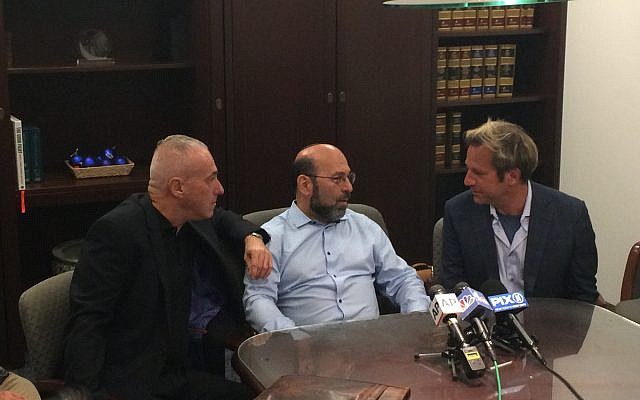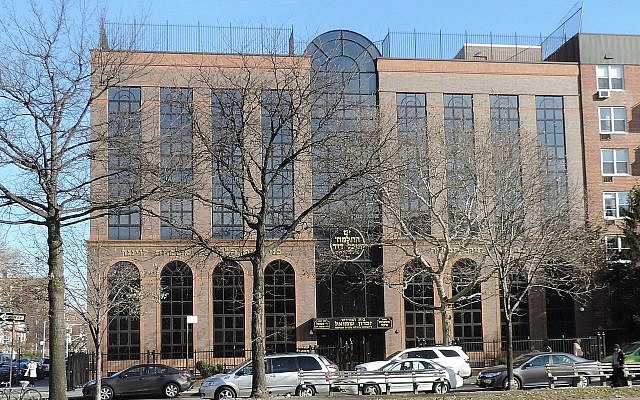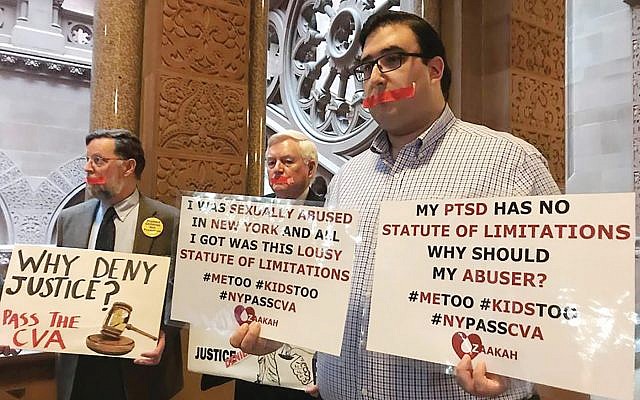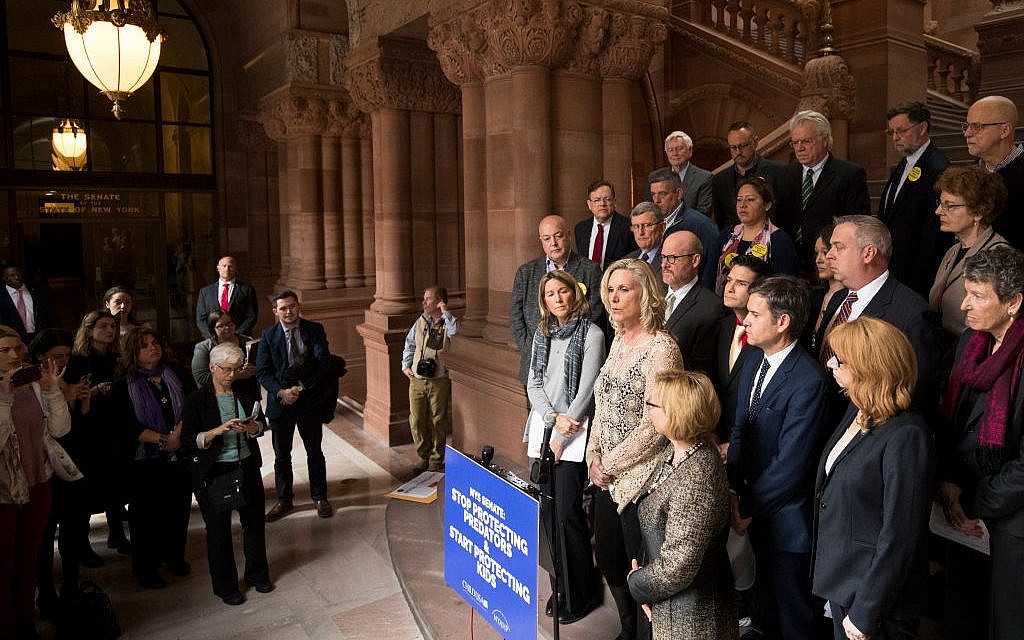Through ‘Lookback Window,’ Jewish Orgs Face Retribution for Child Sex Abuse
As child abuse cases against yeshivas mount following a one-year lookback provision, questions turn to legal strategy. Are their fears of bankruptcy warranted?
When a one-year lookback provision created by New York’s new Child Victims Act opened last month — temporarily lifting the statute of limitations on civil
child sex abuse cases and allowing survivors of any age to pursue
justice through the courts — youth-serving institutions across the state
braced for legal fire.
Now, just weeks after the lookback
clause went into effect, Jewish institutions across the denominational
spectrum are facing legal retribution for allegedly mishandling
allegations of child sexual abuse, with claims reaching as far back as
the 1950s. In the handful of cases filed thus far, prominent defendants
include the National Ramah Commission, the Conservative movement’s
camping arm; the Conservative movement’s flagship rabbinical school,
Jewish Theological Seminary; Modern Orthodoxy’s flagship institution, Yeshiva
University; prominent Modern Orthodox day school Salanter Akiba
Riverdale High School (SAR); prominent Modern Orthodox day school
Westchester Day School; Yeshiva Torah Temimah, a Brooklyn-based
ultra-Orthodox school with a branch in Lakewood N.J.; Oholei Torah, a
prominent Chabad yeshiva in Brooklyn; and Temple Beth Zion, a legacy
Reform congregation in Buffalo.
Claims leveled against these institutions
include negligence in stopping or preventing sexual abuse; breach of
fiduciary duties; and the intentional infliction of emotional distress
against survivors of childhood sex abuse. Though details among the cases
vary, leadership across institutions are alleged to have known about
predatory behaviors and failed to act; helped alleged abusers gain entry
to other youth-serving institutions; and engaged in intimidation
tactics to prevent victims from coming forward.
Claims leveled against these institutions include negligence in stopping or preventing sexual abuse; breach of fiduciary duties; and the intentional infliction of emotional distress against survivors.
Yeshiva Torah Temimah, an all-boys
charedi school based in Brooklyn, faces a new lawsuit for covering up
the alleged sexual abuse perpetrated by Rabbi Yehuda Kolko, who taught
at the school from the 1960s throughout the ’80s. Four ex-students
previously sued the school, charging Kolko molested them from ages 11 to
13; at the time, the state court tossed the cases after determining
claims fell outside the statute of limitations then in place.

(L-R) Barry Singer, Jay Goldberg, David
Bressler three of the plaintiffs in the suit against Yeshiva University
at a recent press conference announcing their suit against YU
(Previously, the school agreed to pay an unprecedented $2.1 million to two former students who accused Kolko
of sexually assaulting them. Details of the secret settlements emerged
in 2016 when the school failed to make payments. The case marked the
first time a New York yeshiva paid off alleged victims of sex abuse,
experts said. Kolko, now 72, received a controversial plea deal
from then-Brooklyn District Attorney Charles Hynes in May 2012 after
pleading guilty to two misdemeanor counts of child endangerment; he did
not have to serve jail time or register as a sex-offender.)
Now, the case is being revived under the
Child Victims Act. Alleged victim Baruch Sandhaus filed a complaint in
Brooklyn Supreme Court last month, alleging that Kolko and another rabbi
on staff “would inappropriately touch” his private parts on various
occasions between 1978 and 1980, when he was a student at Torah Temimah.
Hank Sheinkopf, a spokesperson for the yeshiva, said the
alleged events occurred “40 years ago” and so have no connection to the
current administration.
“Why would a new administration know
anything about what took place decades ago?” he told The Jewish Week in a
phone conversation. “It’s not going on today.” The school, he said, is
“financially capable of dealing with a lawsuit” and will “continue to
function and turn out Torah-trained young people.”
Sheinkopf referred to the new roster of
lawsuits — including the revived case against Torah Temimah — as “a
trial lawyer game to make a lot of money.”
As cases begin to play out — a process
that could take years — precedents set in other states that have adopted
similar lookback provisions might provide a blueprint for what
institutions, and survivors, might expect, lawyers say.
“So far, every religious institution I’ve
sued has told its constituents that lawsuits would lead to
bankruptcies,” said Patrick Noaker, the attorney representing plaintiffs
in a new lawsuit filed last week in Kings County Supreme Court against
the Chabad boys yeshiva, Oholei Torah.

Yeshiva Torah Temima in Brooklyn, NY.
Noaker said the passage of the Child
Victims Act won’t make it any easier for alleged victims to win cases.
“Sometimes the time that has passed can make it hard to find witnesses
and evidence that the school knew or should have known that children
were in danger. We also have to prove damages,” he said. “The only thing the Child Victims Act does is open the court room doors. We still have to prove our case like any other,” he said.
“The only thing the Child Victims Act does is open the court room doors. We still have to prove our case like any other.
In February, shortly after the Child
Victims Act bill passed, Agudath Israel of America — a large charedi
umbrella group that long advocated against the bill alongside the
Catholic Church and Boy Scouts of America — issued a statement
warning its constituents that the look-back provision “could literally
destroy schools, houses of worship that sponsor youth programs, summer
camps and other institutions that are the very lifeblood of our
community.”
For Noaker, a Minneapolis-based lawyer
who represented plaintiffs in a host of lawsuits against Catholic
dioceses in Minnesota after the state passed a three-year lookback
window in 2018, the line is familiar.
The argument is straight-up manipulation.
“The Catholics said lawsuits would shut
down hospitals and homeless shelters — it never happened,” said Noaker.
“The argument is straight-up manipulation.”
Though several of the cases he litigated
did contribute to dioceses in Minnesota filing for Chapter 11 bankruptcy
in order to settle hundreds of claims of sexual abuse at the hands of
priests, not one diocese ceased to function because of the financial
decision.

Child victims and advocates during the
debate in Albany in the run-up to a vote on the Child Victims Act
earlier this year.
A major benefit he has seen for states,
like Minnesota and California, that implemented similar look-back
provisions is a “more robust sex offender registry”; suits previously
barred by strict statues of limitations “identify predators that could
still have access to children.”
For Noaker, the case against Oholei
Torah, which brings new allegations of child sex abuse against Rabbi
Joseph (Yossi) Reizes — a religious instructor hired by Oholei Torah in
the ’80s and dogged by allegations of sexual abuse — is his first
venture representing plaintiffs from the Orthodox Jewish community.
Noaker, who has represented victims of child sexual abuse for 20 years,
said he has more lawsuits involving the Chabad-Lubavitch community “on
the way.”
Oholei Torah did not respond to request for comment.
Chaya M. Gourarie, an attorney
representing plaintiffs in the newly filed lawsuit against the National
Ramah Commission, said the “ideal outcome” of these lawsuits is to
“change policies, not bankrupt institutions.”
The deal outcome of these lawsuits is to ‘change policies, not bankrupt institutions.’
“We hope these lawsuits will usher in a
new era where institutions put in safeguards to protect against child
sexual abuse,” she said. “Sometimes, it takes a radical change in the
law to force the culture change we need to see.”
The complaint, filed on Aug. 29 in the
New York State Supreme Court, alleges that then-counselor-in-training
Harvey Erlich was allowed “unrestricted and unsupervised access to
campers, whom he repeatedly molested throughout the summer of 1971.”
(Erlich was arrested on sex abuse charges in 2012 in Canada, which does
not have a statute of limitations on sexual abuse cases. In 2015, Erlich
pled guilty to sexually abusing four minors, aged 9 to 13.)
Marci Hamilton, founder and CEO of Child
USA, a nonprofit that works to prevent child abuse, stressed that
“across the country, there has been no cause-and-effect relationship
between statute of limitation reform and bankruptcy.”
Across the country, there has been no cause-and-effect relationship between statute of limitation reform and bankruptcy.
With new legislation passed in over 20
states and 44 states considering new legislation around statute of
limitations reform, “We’ve finally reached a tipping point,” Hamilton
said.
“It took a quantum of information to be
out in the public square to reach this moment,” she said, mentioning the
grand jury investigation of Catholic Church sex abuse in Pennsylvania,
released last year; the unfolding of hundreds of allegations against
Larry Nassar, the former USA
Gymnastics doctor, in 2017; and, finally, the developing allegations of
child sex trafficking against financier Jeffrey Epstein, who committed
suicide last month.
“The issue has become impossible to
ignore,” said Hamilton. “None of this is terribly surprising for those
of us who have been in the trenches for two decades, but it’s certainly
gratifying.”
More on the Child Victims Act here.https://jewishweek.timesofisrael.com/jewish-institutions-that-mishandled-abuse-cases-decades-ago-now-fear-bankruptcy/?fbclid=IwAR21N6R4HzGfeQsWUovLVo_ZFp4kznsadUm_aevn6diMpfa6-b9_oNh_vdQ





No comments:
Post a Comment